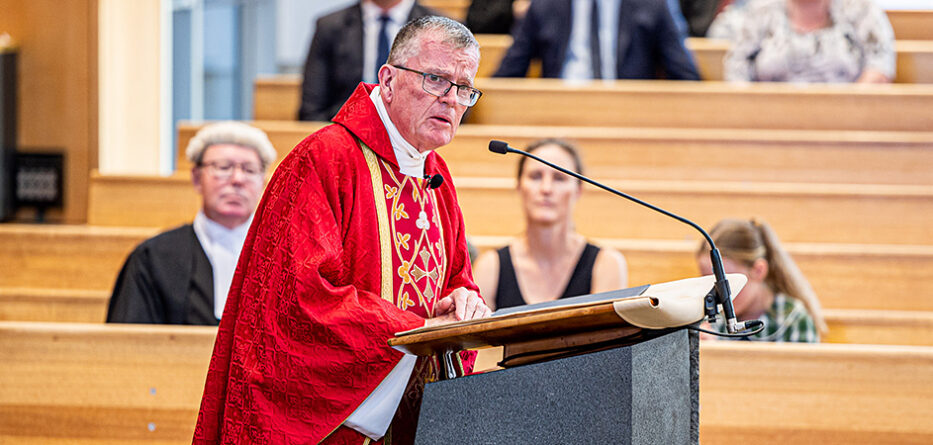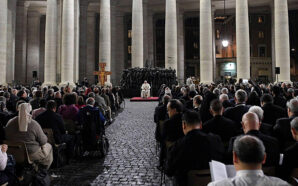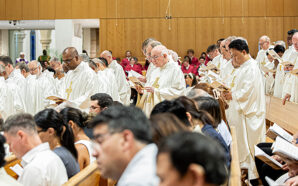Very Reverend Vincent Peter G Williams, Vicar General and Moderator of the Curia
Homily for the Legal Red Mass at St Patrick’s Cathedral, Parramatta
Readings: Isaiah 61:1-3, 6, 8-9, John 14:23-26
6 February 2023
When living in Washington DC in the early 1990’s whilst pursuing further studies at the Catholic University of America it was then possible to drive down 1st NE – the road behind the capital building, from Pennsylvania Avenue. There are two significant public buildings across from the capital itself – the Library of Congress and the Supreme Court. Both structures are monumental, the Supreme Court building favours the neo-Classical Greco-Roman style with elaborate Corinthians columns. On the western pediment the words: “Equal justice under the law” are embossed and on the eastern façade are the words: “Justice, the guardian of liberty.” The prominence of the Supreme Court should come as no surprise given the preamble to the US constitution which states:
“We the People of the United States, in Order to form a more perfect Union, establish Justice, insure domestic Tranquility, provide for the common defence, promote the general Welfare, and secure the Blessings of Liberty to ourselves and our Posterity, do ordain and establish this Constitution for the United States of America.”
The notion of justice being at the core of Western liberal democracies owes in part its origin to our Greco-Roman inheritance and the profound influence of Christianity in Europe from the end of the Roman Empire until the fracturing of the Church as a result of the Protestant Reformation in the 16th century. It was in the late 17th century the beginnings of the Age of Enlightenment that John Locke espoused the view that justice derives from natural law, and in the 19th century John Stuart Mill opined that justice is based on the best outcomes for the largest number of people.
RELATED: Law makers reflect on the Holy Spirit at Legal Red Mass
But what of divine justice and how does that equate to notions of human justice? In the whole of the Bible there are 328 instances of the word justice being used – 298 in the Hebrew scriptures and 30 in the New Testament. Of the Hebrew scriptures by far the most references are in the Prophecy of Isaiah – some 62 of them. Biblical scholars have long asserted that there are “three hands” at work in the prophecy, Chapters 1-39 being that of the 8th century prophet who bears the name Proto- Isaiah, Deutero or second Isaiah who wrote during the time of the exile in Babylon in the 6th century and who was responsible for chapters 40-55 and the Trito, or third Isaiah who penned chapters 56-66 after the return from exile. It is a passage from this third Isaiah that constitutes our first reading at the Eucharist this evening. The concern expressed in the entirety of the work though is for the justice of God to be pre-eminent in the minds of the people of Israel. Each of the authors had an opportunity in their own time of writing to reflect on what had led to the catastrophic collapse of the nation and its subsequent exile in Babylon.
Over the course of Jewish history there had been several significant shifts in the understanding of their unique relationship with God first revealed to the patriarch Abraham. For centuries the covenant forged at Mount Sinai through the towering figure of Moses had been the basis for that relationship built around the decalogue, the Ten Commandments that broadly defined one’s obligations to God and one’s social responsibilities in respect to relationships with others. By the 11th century BC Israel like its surrounding nations had adopted kingship as its form of government and saw in the figure of the king the anointed one of God and a pledge of God’s abiding favour on his people. The epic figure of David and the legacy of the Davidic dynasty remained until the time of the exile. The people came to believe that Solomon’s Temple was the guarantor of their security and in a somewhat bizarre way operated as a sort of talisman that gave them a false sense of security. If the Temple stood in Jerusalem their survival was assured. The prophet Jeremiah who was contemporaneous with the second Isaiah railed against the people of Judah because he understood their false sense of security and that they simply were “going through the motions” of religious observance but continuing to engage in a way of living that reflected nothing of the justice of God. In fact, it was the complete reverse with exploitation, oppression, and a complete disregard for the dignity of their fellow Judeans. In a passage where the people of the Northern Kingdom of Israel and their leaders are castigated, the prophet Amos, another contemporary of Isaiah expresses the attitude of God in this withering critique:
I hate, I despise your festivals, and I take no delight in your solemn assemblies.
Even though you offer me your burnt offerings and grain offerings,
I will not accept them, and the offerings of well-being of your fatted animals I will not look upon.
Take away from me the noise of your songs; I will not listen to the melody of your harps.
But let justice roll down like water and righteousness like an ever-flowing stream.
It is clear from the Biblical record that both religious and social life in both the Kingdoms of Israel and Judah were morally bankrupt and the extent of corruption and religious observance was perfunctory.
When liberation was made possible by Cyrus after he had conquered Babylon, there was the possibility of renewal of the covenant with God that would not simply be based on an acknowledgement in some tacit sense of the unique privilege of being the “chosen people” but would be evident in the way in which covenant living would be expressed. This is expressed in the Book of Ezra which tells of the return of the first exiles to Jerusalem and their determination not only to rebuild the Temple but to restore the covenant in all its fullness. It would be a return to the understanding of mutual obligation to the well-being of everyone based on the Mosaic covenant, so that individuals could thereby flourish, and the common life would be underpinned by adherence to the law of Moses.
It is then in this context of looking forward to this restoration that we hear third Isaiah exclaim:
The Lord has anointed me. He has sent me to bring good news to the poor, to bind up hearts that are broken; to proclaim liberty to captives, freedom to those in prison; to proclaim a year of favour from the Lord.
Isaiah understood that if the moral fabric of society was going to be restored then it had to begin with each individual understanding his or her own responsibility to live lives that reflected God’s justice. If one’s own life lacked a moral compass, then to achieve social cohesion would be almost impossible. The common good based on the justice of God could only be achieved by personal transformation and an acute sense of that justice as the guiding principle in all life’s decisions. There is here needless to say an implied tension – but one that is creative and is ultimately dependent on a source beyond the human – access to Divine wisdom. Dealing with that intersection between the human and the Divine is what is constitutive of being a person of faith.
Which brings us to some of the challenges that face our own contemporary society as we too wrestle with ever expanding complex moral, social and legal questions. Increasingly we are confronted with what seems to be a dissonance between the rights of individuals and what many perceive to be the common good. Whilst this is not the place to embark on a study of the emergence of rampart individualism (which arguably can be sourced to the time of the Enlightenment and has been gathering pace ever since) legislators have been most agile in formulating new laws which seek to exalt the individual often I think at the expense of a common set of agreed values and standards in terms of conduct that can be assumed to be the common possession of all who live in this society. One can sense an unease with some of these trajectories and because we adhere to a strict separation between Church and State, and these days for reasons some would say of political correctness, only give lip service to the Judeo-Christian ethos which is foundational to much of our culture, and indeed much of the framework that the legal system in built on. It is becoming a space where even “angels would fear to tread” lest they be cancelled out or accused of representing the last vestiges of a Neanderthal age!
This inevitably must result in times of discomfort for those who are practitioners of the law and people of faith. When faced with such conundrums what does the Church in its teaching and tradition have to offer if anything?
The Gospel passage we hear tonight comes from the Last Supper discourses in John’s Gospel. In the intimacy of the upper room on the night before his trial and death Jesus takes the opportunity to assure his disciples of his abiding presence in their lives once he is taken from them. Happily, he uses a legal term to reveal one attribute of the Holy Spirit – the Spirit will act as an advocate to those who will embrace life in Christ through baptism. Through the Spirit we will be given the insight and the wisdom to know how to be and how to act if we are to maintain a right disposition in what we are called to do – in the case of most of you here as legal practitioners seeking to represent others or make judgements in order that justice in all his facets might prevail. The nature of human conflict and seeking remedies through the process of the law may at times I suspect result in more areas of grey than clarity and might often lead one to wonder whether at the end of a matter that justice has in fact been served.
Yet I would also want to suggest that it is possible for the practitioner of faith to develop over the course of a lifetime a spiritual jurisprudence which would imply that being in the service of the law is very much part of the Divine project that seeks the dignity, equality and flourishing of all those made in the image and likeness of God.
We need to instill in the community at large confidence in our legal structures and those who serve the law. That in recent years as voices become shriller and more fractious the tendency has been to question the integrity of the law and its practitioners which appeals to a rather unsophisticated naïve populism. The legal practitioner of faith will want to acknowledge that his or her vocation to the law has in part a divine commission which will find expression through the exercise of that spiritual jurisprudence that accrues over a lifetime of practice, and which ultimately can only enhance the pursuit of justice with integrity – thus engagement in the law also requires reflective spiritual contemplation and the Holy Spirit the Advocate.
At this Mass we pray that the Holy Spirit will above all penetrate our hearts and minds and lead us into the truth so that we may with confidence stand before the judgement seat and hear Divine voice say: “well done good and faithful servant – come an enjoy the place prepared for you.”








